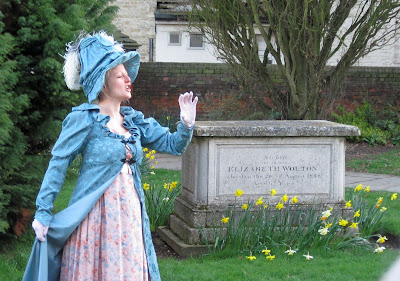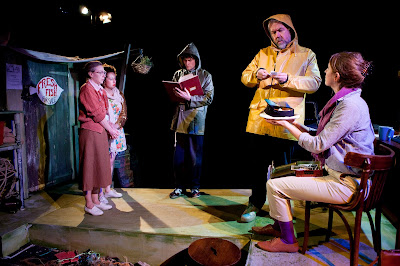HAY FEVER
The Hutton Players
Brentwood Theatre
March 24 2011
Mary Redman was at the back of the stalls ...
Noel Coward was known as The Master for many reasons including his mastery of sparkling repartee, his use of language to define both character and class, for the craftsmanship of his plays and their sheer entertainment value. Any group that wants to recreate for us his lost world needs to pay careful attention to pace, diction, period details and above all, energy. The plays need to sparkle as they have always done.
I saw this production on opening night and by the interval at the end of Act I was ready to shoot myself. This really surprised me because many of the members of Hutton Players are of mature years to remember how things were done as far as social and table etiquette are concerned. Plus they have enormous theatrical experience.
First of all Ray Howes's set design was so disappointing, being very déclassée and looking as though it was furnished from a jumble sale. Certainly not shabby chic - if that was the intention. One has to remember that this was a country home at Cookham, not a cottage, and this set didn't scream at us that it was the comfy retreat of an enormously successful actress and equally successful writer. Plus sight lines for the sofa were so bad much of the action was missed.
As the two younger members of the ironically named Bliss household, Vicky Wright's Sorel looked extremely good but swallowed her words while both she and John Mabey's Simon lacked the necessary pointing of lines so that by contrast with the older cast members there appeared to be two different plays going on. Helen Robins as the very young ingénue Jackie was another one who looked daintily pretty but whose words were often hidden by her giggles
As the house and its Japanese Room filled with extra guests invited without prior warning by every member of the family for a “quiet weekend” the production underwent a transformation. The great change came in Acts 2 and 3 when the other characters really came into their own, perhaps after an interval team pep talk by the director Marjorie Dunn rallied the troops.
Margaret Corry's “retired” leading lady and grande dame of the theatre took to her role with relish. Clashing verbal swords with her friend Myra (Meryl Spinks in fine form and equally ready for battle), the two of them took no prisoners. Watching them in both verbal and physical action was like being in the front row while a well-matched pair of Wimbledon Ladies Finalists played a blinder of a swift power serve and volley match lightened by the occasional lengthier rally.
Observing the action and giving the ingredients an occasional stir or nudge whilst enthusiastically lapping up the resulting effects was Martin Goldstone's David Bliss, innocent as the day is long and a bit of a dog to boot.
Excellent supporting work came from Lindsey Crutchett's withered twig of a theatrical dresser now enlisted as a housekeeper and Alan Thorley's enthusiastic admirer of Sorel.
The utter, five star highlight of the evening was the exquisitely played and timed flirting scene between Judith and William Wells's boring Richard with his character's annoying attempts at a “natural” laugh. Watching his body language as he leaned further and further off centre, quite overwhelmed by Bliss, spoke volumes about his pop-eyed astonishment at being supposedly wooed by a “bedazzled” and entrancing Judith blatantly re-enacting one of her major stage successes.
Kathy Smith's faultless, hard working stage management team deserve every praise especially for the speed with which they set up the complete breakfast for eight.
The result is that whilst I wouldn't willingly want to sit through Act 1 again the rest of this production was great fun and full of goodies.



















